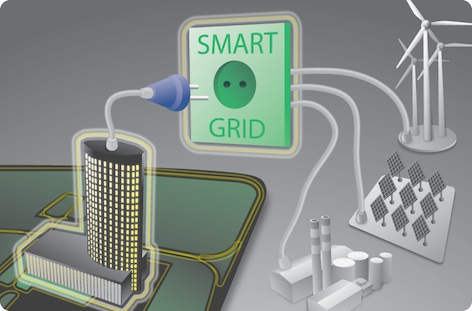Over the past decade, the world has seen an influx of new technology to aid with the desire to “go green” and help save the planet from global climate change. From companies providing free in-home surveys of energy use to LED lights that help reduce our consumption, the energy industry is booming with innovative ideas that could help optimize efficiency and reduce waste.
 One recent technological advancement that’s been getting a lot of press recently is the Smart Meter. The Smart Meter is a digital electric meter which replaces the analog one in your home. The new digital meters come equipped with wi-fi connectivity, which enables the meters to provide information as to when, how, and where in your home you are using the most energy, and also how much it costs you to use said energy. It also connects to a network of other meters, creating the Smart Grid. The grid is the path of lines, transformers, and substations from the power plant to your lightbulb.
One recent technological advancement that’s been getting a lot of press recently is the Smart Meter. The Smart Meter is a digital electric meter which replaces the analog one in your home. The new digital meters come equipped with wi-fi connectivity, which enables the meters to provide information as to when, how, and where in your home you are using the most energy, and also how much it costs you to use said energy. It also connects to a network of other meters, creating the Smart Grid. The grid is the path of lines, transformers, and substations from the power plant to your lightbulb.
India is getting on board with the Smart Grid, having invested $10 billion to begin the transition. The process includes GIS mapping, metering, and logging each transformer and feeder in the country, and is not any easier than it sounds. Despite the exorbitant cost (as well as the time and energy that it entails), there are hopes that the grid will be largely beneficial to India and will end the ongoing power theft issues that sweep the country.
While it is not expected that India will have the exact same results as North America has had thus far in the smart grid market, the devices should still yield some immediate benefits for India. For instance in American homes, it’s been noted that there are decreased brownouts, blackouts, and surges of power since the placement of Smart Meters. It also eliminates the guessing game when it comes to your utility bills, by giving you a better estimation of what your bill will cost. This has proven to be extremely helpful with utilities in the U.S., especially in the Midwest: people are paying smaller utility fees in Chicago, Illinois, and it’s also helped to reduce natural gas prices in Canton, Ohio, where homes have to be equipped with gas heat through the cold winters. A predictable bill is helping homeowners better manage their expenses, and power companies better supply power where it’s needed, both of which would be welcome developments for India as energy infrastructure is upgraded in coming years.
While the benefits of smart grids include easier access to information on how, when, and where you use the most energy in your home, consumers are concerned about their privacy. Some homeowners believe that smart meters are part of a plot to spy on the citizens by the government, while others believe that it is simply uncomfortable to know that their home is being monitored by the power companies. Meanwhile, the U.S. Office of Electricity Delivery and Energy Reliability recently released the Smart Grid Voluntary Code of Conduct in the promises that there will be no unlawful spying in the homes of Smart Meter users.
It remains to be seen what the public reaction in India will be as smart meters are increasingly utilized, but it seems that the benefits of these technological advancements, and the lack of evidence for the scary scenarios some are associating with smart meters, mean that they should be a net positive for India’s energy needs.






